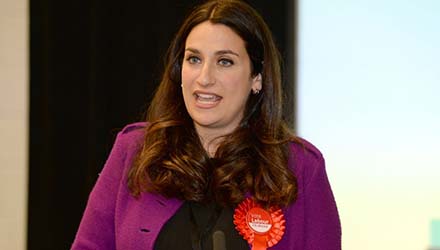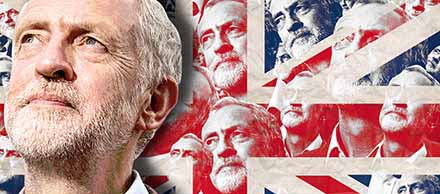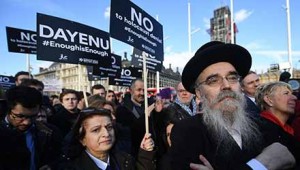The formation of the Independent Group vindicates what the left has long been saying. So called ‘moderate’ Labour MPs belong in another party
As everyone knows, on February 18, seven parliamentarians – Luciana Berger, Chuka Umunna, Chris Leslie, Gavin Shuker, Angela Smith, Ann Coffey and Mike Gapes – announced that they were forming the ‘Independent Group’ of MPs, and the next day they were followed by Joan Ryan. Then, on February 20, they were joined by three Conservative MPs: Anna Soubry, Sarah Wollaston and Heidi Allen.
But let me deal first with the Labour defectors. Typical was Ryan’s statement: “I cannot remain a member of the Labour Party, while its leadership allows Jews to be abused with impunity and the victims of such abuse to be ridiculed, have their motives questioned and their integrity called into doubt.” The others made similar claims, with Berger stating that since Jeremy Corbyn’s election as leader Labour had become “institutionally anti-Semitic”. In reality, what we have, of course, is not a situation where Jews are “abused with impunity”, but one where rightwing Labour MPs – some of whom happen to be Jewish – are being criticised for their disloyalty.
For example, as far as I know, there is no evidence that any of the Wavertree Labour members supporting a motion of no confidence against Berger had made any anti-Semitic comments. She was targeted not because she is Jewish, but because of her refusal to commit to the party! Just before the original seven quit, a statement was being circulated on social media calling on all Labour MPs to pledge to work for a Labour government “under whatever leadership members elect”. Reasonable, you might think. But Gavin Shuker complained that, by being approached in this way, he was being told to “completely obey and not question Great Leader Jeremy Corbyn”.
However, while such responses are self-evidently pathetic, the media for the most part is behaving as though they are totally in order. For instance, on February 20, Radio Five Live featured a phone-in, where listeners were asked why they thought that prejudice against Jews was not being countered as rigorously as racism against black people – the assumption being, of course, that this was the attitude of the Labour leadership.
Yet no examples of actual anti-Semitism were given. A representative of the Jewish Labour Movement was asked to relate his own personal experience and he immediately came up with a comment directed against him at a recent Labour Party meeting: someone had responded to what he had said by stating that he was a “well-known Zionist”!
And what about deputy leader Tom Watson? He has declared that Berger was the “first casualty” of anti-Semitism and he “no longer recognises” his own party. Acting as though the eight were genuinely committed to ‘Labour values’, he complained that “There are those who are already celebrating the departure of colleagues with whom they disagree”. Talk of “betrayal”, he said, does nothing to help explain why “good colleagues” might want to leave Labour. He called on Corbyn to bring Labour back into the “mainstream tradition”.
In other words, the party’s number two is only just stopping short of saying that the eight were right to leave, because, following Corbyn’s election, ‘Labour is no longer the party I joined’. Watson is clearly unfit to serve as deputy leader. But the real agenda is obvious. It is to prevent by any means possible the election of a Corbyn-led government in the interests of the establishment and British capital.
Just look at the statement promoted by the Independent Group at its launch press conference. It does not take much reading between the lines to see what they are up to. They want to “pursue policies that are evidence-based, not led by ideology”: we need to “reach across outdated divides”. The “ideology” they are particularly opposed to, of course, is Corbyn’s. After all, “Britain works best as a diverse, mixed social-market economy, in which well-regulated private enterprise can reward aspiration and drive economic progress.” By contrast, Labour is now “hostile to businesses large and small; and threatens to destabilise the British economy in pursuit of ideological objectives”. There is no “ideology” behind this blatant pro-capitalism, is there?
As for foreign policy, “We believe in maintaining strong alliances with our closest European and international allies on trade, regulation, defence, security and counter-terrorism.” Yet Labour “now pursues policies that would weaken our national security” and “accepts the narratives of states hostile to our country”. In other words, Labour must remain firmly in the imperialist camp.
Centrist party
It was hardly an impressive launch, with each of the seven giving their own separate, often incoherent assessments of the way ahead. For the most part – unlike the Gang of Four, which split to form the Social Democratic Party in 1981 – they are nonentities.
But that does not mean they can just be written off. For example, that is exactly the implication in the Morning Star front-page headline – “The insignificant seven” (February 19). But Joan Ryan is only the first of a number of other Labour rightwing MPs likely to join them. Those said to be on the verge of quitting include Margaret Hodge, Louise Ellman, David Lammy and Ian Austin. As for Jess Phillips MP, who has also come under attack for failing to commit fully to the party, she “has had to put nine locks on her door out of fear for her safety” (The Daily Telegraph February 19). Well, what can you say about behaviour that forces you to put nine locks on your door?
And when the Parliamentary Labour Party – meeting in the evening following the Independent Group’s initial press conference – heard John Cryer, the PLP chair, “pay tribute” to the defectors, it reacted mostly with applause. But this response has hardly been countered by the leadership, with Corbyn himself saying he was “disappointed” the original seven had left and publicly thanking them for their past service to the party. As for John McDonnell, although he correctly stated that the defectors should now do the “honourable thing” by resigning as MPs and standing for re-election, he also bent over backwards before their accusations (particularly over ‘anti-Semitism’), promising a “mammoth listening exercise”.
We should not be misled by the relatively low profile of the original defectors. It is not only other Labour MPs who are considering joining them. In addition to Soubry, Wollaston and Allen, an unnamed minister and three other MPs are also said to be considering doing so. Of course, it is not Corbyn’s leadership of Labour that motivates the Tories, but their own government’s stance on Brexit. If Theresa May presses ahead with a ‘no deal’, that will surely trigger a reaction of some kind – no doubt this has already been taken into account by the Independent Group following their prior discussions with such Tories.
The IG statement declares that, in addition to all its other shortcomings, Labour under Corbyn’s leadership has “failed to take a lead in addressing the challenge of Brexit and to provide a strong and coherent alternative to the Conservatives’ approach”. This is a key motive in the thinking of those who want to form a new centrist party – stay in the European Union, possibly after a second referendum. It also no doubt figures prominently in the thinking of the likes of Liberal Democrat leader Vince Cable, who is said to be considering stepping down to make way for a new centre party under a different leader after the local elections in May.
We should not underestimate the damage such a party could cause. It is not its electoral impact that should worry us though. Unless we are talking about a national government – far from impossible – a new centrist party will not sweep the board at the next general election. Indeed it would be lucky to retain the MPs it already has. No, it is the chilling effect that a rightwing split might have within the Labour Party. The cowardly statements coming from Corbyn and McDonnell do nothing to embolden the leftwing rank and file in the constituencies. But if anyone wants Jeremy Corbyn in No10 and John McDonnell in No11 committed to actually enacting the programme outlined in For the many, not the few, then the Parliamentary Labour Party has to be thoroughly renewed.
The careerists, the pro-Nato, pro-capitalist right must be deselected and replaced by candidates who are not only committed to defend Corbyn against the right, but who have a proven record as class fighters and are committed to genuine socialism.
Unless that happens, there are a numbers of dangers. Firstly, Corbyn could be nudged, bullied and forced ever further to the right – we have already seen his collapse over Trident renewal, his now Platonic republicanism, his criminal silence over the ‘Anti-Zionism equals anti-Semitism’ witch-hunt. Secondly, the left in the constituencies could be lent on by the leader’s office not to hold trigger ballots in order to avoid adding to the number of defectors. Thirdly, in the event of Corbyn rediscovering his left-reformist past, the present rightwing majority of Labour MPs will not give Corbyn the parliamentary vote of confidence the constitution requires in order to form a government. The monarch will be advised by the privy council to look at another figure in the House of Commons who can get a vote of confidence.
So the formation of the Independent Group needs to be turned from a warning that Labour will suffer further splits, if the left presses ahead with trigger ballots, into proof that the majority of sitting Labour MPs are traitors to the working class and ought to go – and go quickly.
Peter Manson
(this article first appeared in the Weekly Worker)




 The March 26 demonstration in Parliament Square has to be firmly seen in this context. It had nothing to do with any mural, Facebook group or anti-Semitism. Trying to get rid of Corbyn has so far proved futile. As long as the man remains popular among Labour members, they just cannot get shot of him. Having weathered a storm of attacks at the beginning of his leadership with admirable aplomb, he is also unlikely to resign.
The March 26 demonstration in Parliament Square has to be firmly seen in this context. It had nothing to do with any mural, Facebook group or anti-Semitism. Trying to get rid of Corbyn has so far proved futile. As long as the man remains popular among Labour members, they just cannot get shot of him. Having weathered a storm of attacks at the beginning of his leadership with admirable aplomb, he is also unlikely to resign.